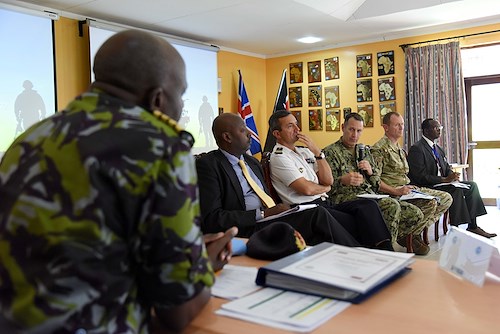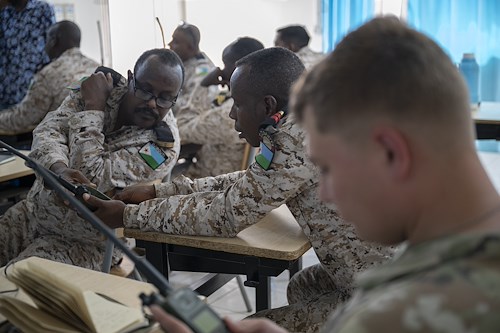Gallery contains 4 images
×
Photo 1 of 4
Regional Senior Mission Leaders Course in Kenya concludes 13th iteration
U.S. Navy Rear Adm. Trey Wheeler answers a participant’s question during the Regional Senior Mission Leaders Course at the International Peace Support Training Centre in Karen, Kenya, Feb. 17, 2016. As part of the two-week course, attendees from 13 countries, including Burundi, China, Comoros, Denmark, Egypt, Kenya, Malawi, Mali, Rwanda, Somalia, South Sudan, Sudan, and the U.S., participated in a panel discussion featuring visiting senior leaders from prominent organizations working in East Africa. (U.S. Air Force photo by Staff Sgt. Victoria Sneed)
Photo by: U.S. Air Force Staff Sgt. Victoria Sneed
Photo 2 of 4
Regional Senior Mission Leaders Course in Kenya concludes 13th iteration
U.S. Navy Rear Adm. Trey Wheeler, Combined Joint Task Force-Horn of Africa deputy commander, speaks about his personal leadership perspective during the Regional Senior Mission Leaders Course at the International Peace Support Training Centre in Karen, Kenya, Feb. 17, 2016. Wheeler touched on characteristics he deemed key in a successful leader such as confidence, humility, good communication, and cultural awareness. (U.S. Air Force photo by Staff Sgt. Victoria Sneed)
Photo by: U.S. Air Force Staff Sgt. Victoria Sneed
Photo 3 of 4
Regional Senior Mission Leaders Course in Kenya concludes 13th iteration
Attendees from 13 countries participate in a question and answer panel discussion with senior leaders during the Regional Senior Mission Leaders Course at the International Peace Support Training Centre in Karen, Kenya, Feb. 17, 2016. Students asked the speakers about their leadership styles and philosophies as well as their organization’s missions in Africa. (U.S. Air Force photo by Staff Sgt. Victoria Sneed)
Photo by: U.S. Air Force Staff Sgt. Victoria Sneed
Photo 4 of 4
Regional Senior Mission Leaders Course in Kenya concludes 13th iteration
U.S. Navy Rear Adm. Trey Wheeler, Combined Joint Task Force-Horn of Africa deputy commander, meets with leaders from French, British and Kenyan forces during the Regional Senior Mission Leaders Course at the International Peace Support Training Centre in Karen, Kenya, Feb. 17, 2016. Military, civil and police forces from 13 countries gathered to hear different perspectives from leaders who manage and conduct peace support operations in Eastern Africa. (U.S. Air Force photo by Staff Sgt. Victoria Sneed)
Photo by: U.S. Air Force Staff Sgt. Victoria Sneed
Military, government and police officials from 13 countries gathered for the 13th Regional Senior Mission Leaders Course at the International Peace Support Training Centre in Karen, Kenya, Feb. 15-26, 2016.
The IPSTC near Nairobi is an independent East African research, training and education center that conducts the RSMLC two times a year and hosts frequent international training events on topics ranging from child protection to preventative diplomacy.
The RSMLC is designed to strengthen senior leadership among partners such as the Eastern Africa Standby Force, a regional organization whose mandate is to enhance peace and security in Eastern Africa. The course also provides a forum for participants to be exposed to international leadership at its most senior level.
Countries participating in the course included Burundi, China, Comoros, Denmark, Egypt, Kenya, Malawi, Mali, Rwanda, Somalia, South Sudan, Sudan, and the U.S.
The goal of the two-week course was to provide participants with a standardized set of skills to plan, manage and conduct deployed support for U.N. and African Union peace missions.
Kenya Defence Force Brig. Patrick Muta Nderitu, IPSTC director, invited senior leaders from around the Horn of Africa to speak at the RSMLC about their leadership experiences and their organization’s mission.
U.S. Navy Rear Adm. Trey Wheeler, Combined Joint Task Force-Horn of Africa deputy commander, attended the panel discussion and shared his perspective of leadership.
“When I received my assignment to CJTF-HOA, I began to ask myself, what from my experiences would translate to my new role?” said Wheeler. “What traits and skills would I need to be successful?”
Wheeler reflected on the leaders from his past and some traits they possessed that stood out as good examples of leadership. Every leader in his past came from a different culture and had unique experiences, strengths and weaknesses. However, they possessed similar leadership characteristics, which the admiral shared with the course participants during the discussions.
“Good leaders demonstrate confidence with humility and ensure they, as well as their subordinates, maintain a healthy work/life balance,” he said.
Understanding cultures, specifically how people communicate, was another point Wheeler keyed in on.
“Americans are normally low context communicators. We tend to be direct, clear and concise,” said Wheeler.
Working in a multicultural and coalition environment as the deputy commander of CJTF-HOA, Wheeler has learned that not everyone communicates the same.
“Some countries in our theater communicate at high content,” the admiral said. “In some instances, what is not said may be just as important as what is said, and body language can play a key role in communication. We must always be aware of what message we are sending.”
Another panel member, U.K. Brig. Mark Christie, defense attaché in Nairobi, also provided his perspective on leadership.
Christie spoke about retired U.S. Army Gen. Stanley McChrystal, former International Security Assistance Force commander in Afghanistan, and his use of “courageous restraint” to limit non-combatant casualties and collateral damage in his area of responsibility. This plan required reducing the use of force unless a defined target was clearly identified. Christie explained that although this policy was unpopular at the time, it proved successful in reducing needless damage and death.
These points were pressed upon the attendees to keep in mind as they progress in responsibility and become more influential in their own organizations.
“Peacetime support operations are extremely complex,” said Wheeler. “The environment we may find ourselves in may be entirely new to us and those we lead. Developing confidence with humility, focusing on good communications, understanding the culture, and making decisions based on a foundation of strong character and integrity will make us successful.”
















